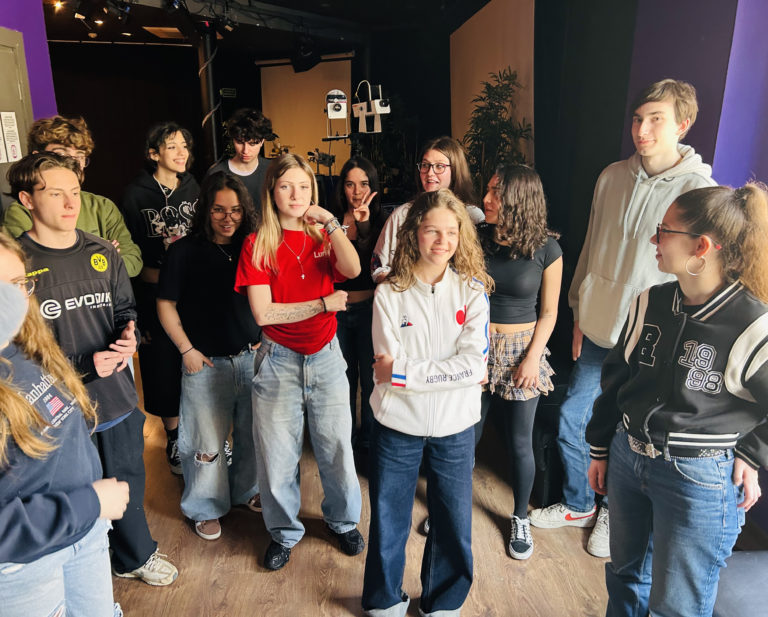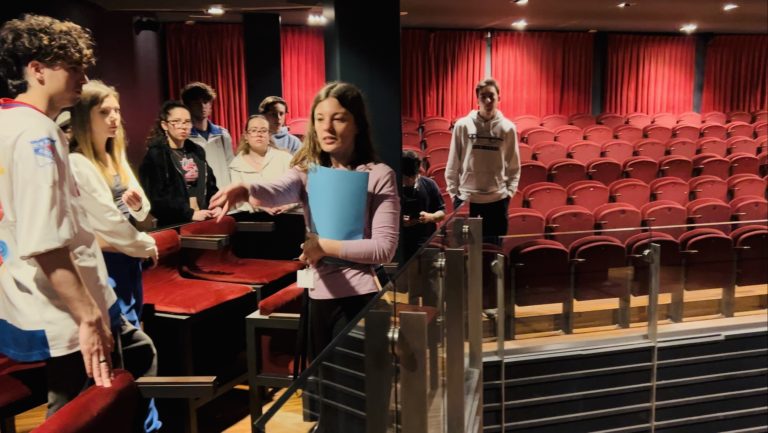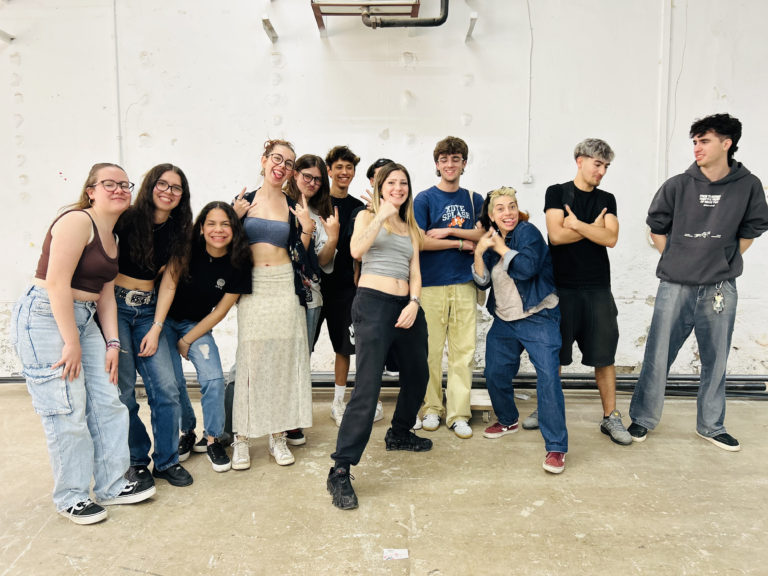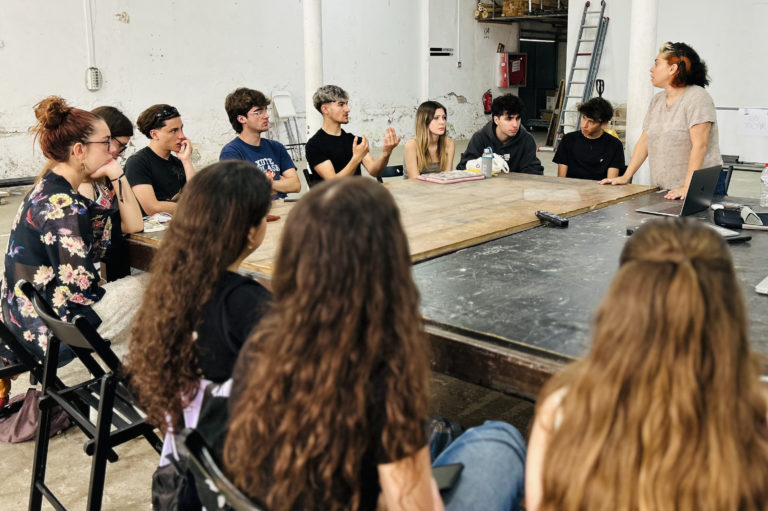This article is part of Reset! Yearly Focus 2025: Reclaiming Spaces
Authors: Marushka Vidovic and Aileen Morrissey
In Barcelona, a cultural organisation and a group of teenagers are attempting to reshape the future of cultural participation—by (re)claiming their space not just as audiences, but as creators. As part of Spain’s broader push to enshrine cultural rights in public life, the BOCA project offers a interesting case for how youth-led, community-based initiatives can transform cultural spaces into platforms for expression, empowerment, and democratic engagement. The article explores how co-creation and cultural agency among teenagers are redefining what it means to truly participate in culture—and why that matters more than ever.

BOCA's 2025 Youth Council meetings in Barcelona – © BOCA
In 2021, the city of Barcelona brought in its “Fem Cultura” Cultural Rights Plan—one of the most ambitious municipal plans for cultural rights in Europe, outlining one hundred specific actions across nine lines of government.
More recently, in 2024, Spain established the pioneering General Directorate for Cultural Rights within the Ministry of Culture, rolling out a comprehensive, community-informed action plan designed to embed cultural rights at the hart of public policy.
Cultural Rights Set the Stage for Participation
Fundamental to identity and social cohesion, cultural rights are deeply intertwined with other human rights, such as freedom of expression, education, and equality, and play a vital role in promoting engaged citizenship, active communities and inclusion in all societies.
By looking at just two of the actions taken by Barcelona City Council, we can see how powerful the shift in policy can be:
- Cultura Viva (“Living Culture”)—a programme that promotes and funds grassroots cultural initiatives.
- Decentralising access to culture— especially in areas historically underserved by cultural institutions.
Why this kind of approach matters—it shifts power from institutions to citizens, fostering democratic cultural participation at the local level, and tackles geographic and social inequalities in access to culture, one of the core goals of cultural rights. It reflects the belief that people engage more meaningfully in culture when it's rooted in their everyday environment, and when local bodies and communities are empowered to take ownership.
This local, participation-based approach to democratising access to culture is particularly effective when working with a very specific demographic—young adolescents, showcased by the BOCA project in Barcelona. Years spent working with secondary-school students means at BOCA they have one thing clear. Teens don’t like to be told what to do. And rightly so. They are at one of the most creative times of their lives. A time for putting their ideas to the test, shouting their passions from the rooftops, and shaking things up.
Not easy in a society which all too often presents an apocalyptic caricature of adolescents: addicted to their phones, riddled with angst, isolated, and apathetic. Which in some cases might be true. But experience tells us that, given the opportunity, adolescents are capable of incredible things.

BOCA's 2025 Youth Council meetings in Barcelona – © BOCA
From Active Listening to Co-Creation
In the hive of culture and music that is Barcelona, under-age teenagers are barely catered for. At this prime time for constructing a cultural identity, both individually and as a community, young teens either have to continue to experience culture with their parents or venture into spaces often anything but age-appropriate. Cultural spaces based on the models created and perpetuated by previous generations.
But what if these models are not relevant to younger generations? It’s impossible to know unless we ask the question. Active listening is a bedrock for projects based on participation. Take this one step further, and we enter the realm of co-creation where not only do young teens express their opinions, and have them heard, but they actually put them into practice. How? By giving them the tools they need to be active players. And then by stepping back and allowing them to take the lead in the creative process.
The BOCA music festival is one example. Now in its third year, it is the result of the dedication of a team of young people, the Youth Council, who spend their Saturdays working together in all the areas of a music festival, creating, learning, and acquiring the skills to become cultural agents—programmers, communicators, producers, or technicians. Through a six-month programme, highly subsidised so as to eradicate potential economic barriers, and the mentorship of music and cultural sector professionals, the young participants are empowered to take the reins of their own cultural experience.
BOCA Research is another example, a new project launched in 2024 with the objective of broadening our knowledge and understanding of the adolescent cultural community linked to the festival. With its core research group made up of a professional researcher, members of management, and adolescent participants from the music festival, the research project affords valuable insights into the experience and benefits of cultural participation for this demographic, and is a prime example of how co-creation works.
An innovative fusion of instruction, design, and field work, the project has enabled the adolescent participants to study the theory, acquire the research skills, and fully participate in the design of the project. An experimental process, which benefited both the participants and the research project itself, as their input, viewpoints, and creativity significantly increased the credibility of the project and its findings. In the case of the field work, the discussion groups of young adolescents led by their peers represented a greatly needed safe space in which to express opinions and concerns with honesty and freedom.

BOCA's 2025 Youth Council meetings in Barcelona – © BOCA
Cultural Agency and Community-Building
As Katrin Prager argues, “co-creation does not stop at actionable knowledge.” Co-creation processes give rise to practical outcomes and are the catalyst for real change. The acquisition of this cultural agency by the BOCA participants is central to their experience and related benefits
Teen participant Jana (16 years-old) describes her experience of co-creation: “I see it as an opportunity for intellectual and emotional expansion. Being and talking with other people can always help us understand worlds other than our own.”
A shared goal in co-creation processes is also key for social cohesion and the creation of community. Noa (17-years-old) explains: ”What makes our co-creation stronger is that we come together. That makes us stronger, and that's our creative power. We all have a common goal, and we all contribute enough to achieve that goal."
On a personal level, taking part in co-creation projects is a unique opportunity to develop and grow. There are many examples of adolescent participants whose emotional well-being, self-confidence, and communication skills clearly improved while creating the festival. “BOCA helped me to realise that I can give my opinion, that I don't have to be afraid of making mistakes, and that I'll always have a safety net to support me.”
It is significant to note that their appraisal of the benefits are almost always described in relation to others. “It's been a real eye-opener for my life, and as a teenager, an incredible opportunity to open myself up to the world, which is what we as teenagers should all be able to do, instead of closing ourselves off in toxic circles or staying at home.”
Direct Participation as Political Education
As the legal age lowers for voters in some parts of Europe (16 in Germany, Austria, Belgium and Malta; 17 in Greece), it is heartening to see that democratic participation by youth is generally on the increase (Youth and Democracy, European Commission, 2024). Nonetheless, only 22% of young people feel that participation in youth groups and initiatives is an important way for their voices to be heard.
Cultural participation and co-creation projects are a very interesting way of fostering a direct and meaningful connection with democratic processes. Horizontal management models, group discussion and debate, the inclusion of diverse viewpoints, and decision-making transparency bring the very concept of democracy down to a tangible level. Cultural agency, the ability to create a significant change in one’s cultural reality, is empowering and connects young people to the essence of citizenship. The higher the confidence in having a say, the higher the level of trust in the institution itself.
The young adolescent participants of the BOCA projects have a keen sense of belonging. Their bond is not conceptual, it is real. They influence how the projects are designed and implemented, and are directly and collectively responsible for the outcome. Their voice, needs and desires, are recognised and taken seriously by the cultural fabric of the city.
These projects stimulate the skill-set which lies at the foundation of citizenship—critical thinking, creative negotiation, collective decision-making—, driving innovation to rethink the cultural models of the past.

BOCA's 2025 Youth Council meetings in Barcelona – © BOCA
Cultural rights may be thriving in Europe, Latin America, and countries like New Zealand, but the pushback in the US on DEI policies clearly indicates that we cannot take these advances for granted. At a time when inclusion is contested, reaffirming cultural rights and participation becomes essential.
BOCA is a celebration of teen culture. By championing cultural rights, it provides real-life awareness of the power of the collective experience and the collective voice.
As we witness the downside of technological advances in ever greater isolation and feelings of separation, these collective in-person experiences, both as co-creators and audiences, are meaningful and necessary. Who gets to imagine the future? At BOCA, the teens are already doing it.
Published on May 27th, 2025
About the authors:
Marushka Vidovic is founder and director of the NouPOP Association, and the award-winning Muntem un Festival educational programme and innovative music festival, BOCA—cultural co-creation projects promoting the transformational power of music and defending cultural rights for youth. A well-known figure in music and radio journalism at Paris’ Radio Nova and web magazine Mondomix, she is now based in Barcelona where she is a founding member of Mellow Productions and guest lecturer at the Missouri School of Journalism.
With a decades-long trajectory in international programming and the creative direction of cross-disciplinary projects, Aileen Morrissey has played a pivotal role in shaping the identity of acclaimed festivals such as Summercase, SOS 4.8, and Utopía. Presently, Aileen serves as co-director and Head of Projects for BOCA in Barcelona, fostering socially-engaged work grounded in cultural innovation.